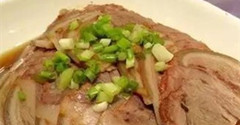About
Shanxi Merchants' Good Faith
( chinadaily.com.cn)Shanxi merchants believed that being faithful and honest were the best way to expand their market. According to business ethics, merchants are driven by profits, yet cheating and fraud is not allowed. In fact, faith and honesty has long been at the core of Shanxi merchants' value view. This is why they enjoyed their good reputation for such a long period.
Chang's Family: Setting up stage in the year of natural disaster
In 1887, the central part of China, including Shanxi, Shaanxi, Henan, andHebei Provinces, experienced its most severe drought in 300 years, with Shanxi at the center of the disaster. The drought lasted for three years. According to historical documents, one-third of Shanxi's population died in the drought.
Of course Shanxi merchants could not escape from this disaster. Like other merchants groups, the Chang family also suffered from economic loss. The Chang's dealt in tea trade with Russian merchants. Normally they carried tea to the border of China and Russia from the southern part of China.
During the drought, people had to eat tree bark and grassroots to survive because there were no crops at all during that time. There was also nothing to feed livestock, meaning the merchants were unable to organize their transport team with livestock. In those years, the Changs' tea export declined from 200,000 dan to 8,000 dan (a weight unit "dan" eaquals 50kg) every year, from which we could estimate their severe loss.
To survive the disaster, the Changs tried hard to overcome the difficulties. They pinched and saved, cutting down the spending. However, surprisingly, Chang's declared their intent to set up a stage in their ancestraltemplewith a budget of 30,000 taels (a tael is roughly worth 38 grams of silver).
Actually, this was not to show their wealth in the difficulty, but to find an excuse to help the local people. To help the local people, the Chang said, "As long as you move even one brick for us, we will pay you with meals."
The Chang's believed that it was not honorable to fish for fame and compliment; therefore they hid their virtue under the excuse of setting up the stage. They only wanted to save local people's life, as well as their dignity. The Chang's s project lasted for three years, the drought's duration. Who could tell how much price the Chang's paid in that period?
Rishengchang: The faith and honesty in the troubled times
In 1900, foreign invaders occupied Beijing. Most of the royal relatives and powerful aristocrats fled in a flurry to Xi'an with Emperor Guangxu. Because of the haste, they could only bring their draft books with them, rather than gold or silver. On arrival at Shanxi, they all went to draft banks to redeem into taels.
Shanxi draft banks also suffered from great loss in the invasion. Not only were their silver stolen, but also their bankbooks were burned.
Without bankbooks, nobody knew who deposited how much money in the bank. So it would have been reasonable for Shanxi merchants to decline the redeeming requests, or to wait until the banking records were cleared up. However, Rishengchang, as well as other Shanxi draft banks, paid all the guests with exact requested amount of taels.
Undoubtedly, Shanxi draft banks assumed high risks for their action. Their action revealed the supreme importance of faith and honesty in the bank industry. Because the guests were royal relatives and aristocrats, Rishengchang believed that these people's political and economic background were still unparallel despite the invasion; therefore, risks might bring back more opportunities in the future.
Rishengchang was right. After the chaos caused by the war, their franchise bank in Beijing not only received considerable deposits from common people, but also official money from the government.

Pingyao smoked meat
Pingyao smoked meat is an indispensable dish for locals at banquets and it is also hugely popular with tourists.


